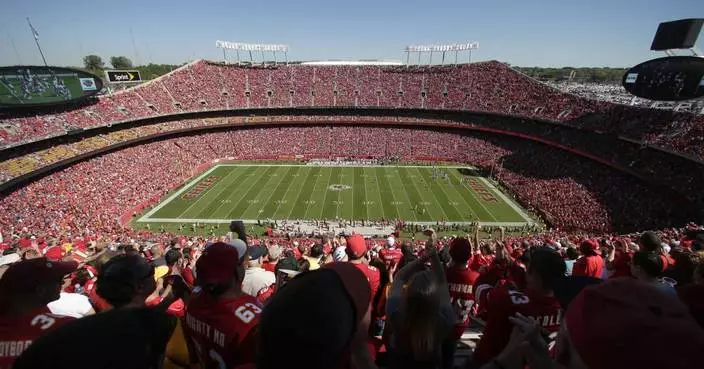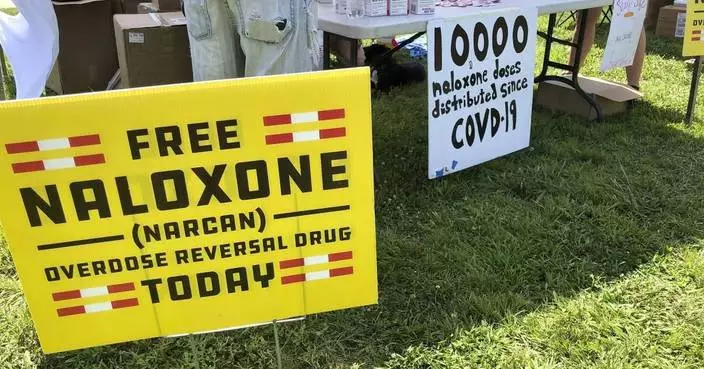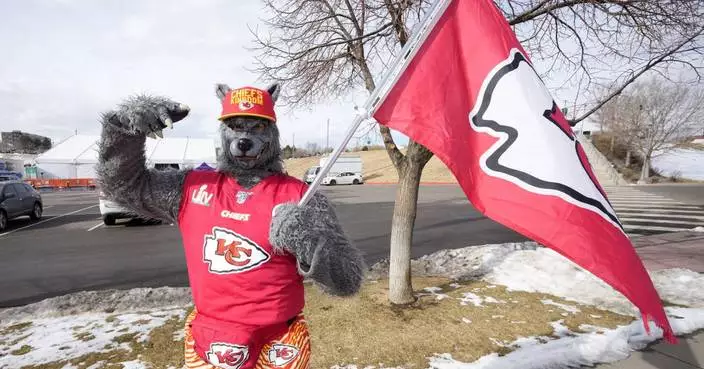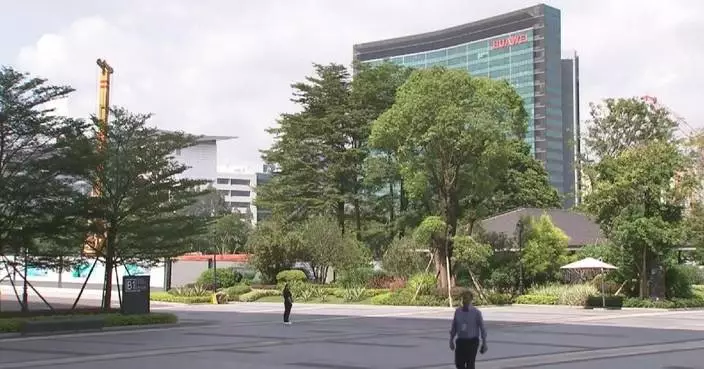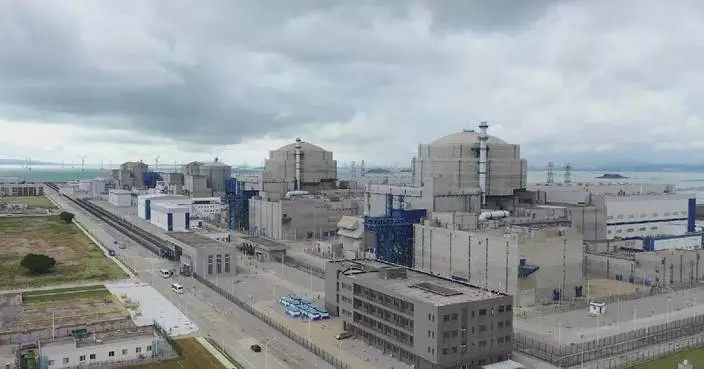Before 14-year-old Guatemalan Samuel Cazun left a Kansas nonprofit to be reunited with his father, he gave staff members the sketches of their faces he had drawn to help them remember him.
Of the dozens of migrant children housed at The Villages in Topeka under a contract with the federal government, Samuel was among as many as nine there who were separated from family members at the southern border under the Trump administration's "zero tolerance" policy on illegal immigration.
Click to Gallery
Samuel Cazun, of Guatemala, left, and his father Ervin, right, leave Cincinnati/Northern Kentucky International Airport as they reunite after being separated about a month ago at the southern border after they crossed the Rio Grande into the United States, Monday, July 23, 2018, in Hebron, Ky. Edvin said they were separated at the "detention" and he spent 15 days without knowing anything about his son. (AP Photo/John Minchillo)
Edvin Cazun, of Guatemala, right, hugs his son Samuel at Cincinnati/Northern Kentucky International Airport as they reunite after being separated about a month ago at the southern border after they crossed the Rio Grande into the United States, Monday, July 23, 2018, in Hebron, Ky. Edvin said they were separated at the "detention" and he spent 15 days without knowing anything about his son. (AP Photo/John Minchillo)
Samuel Cazun, of Guatemala, right, hugs his cousin Nelson, and speaks to his mother on a mobile phone after reuniting with his father Ervin at Cincinnati/Northern Kentucky International Airport following their separation about a month ago at the southern border after they crossed the Rio Grande into the United States, Monday, July 23, 2018, in Hebron, Ky. Edvin said they were separated at the "detention" and he spent 15 days without knowing anything about his son. (AP Photo/John Minchillo)
Samuel Cazun, of Guatemala, left, and his father Ervin, right, leave Cincinnati/Northern Kentucky International Airport as they reunite after being separated about a month ago at the southern border after they crossed the Rio Grande into the United States, Monday, July 23, 2018, in Hebron, Ky. Edvin said they were separated at the "detention" and he spent 15 days without knowing anything about his son. (AP Photo/John Minchillo)
Edvin Cazun, of Guatemala, right, hugs his son Samuel at Cincinnati/Northern Kentucky International Airport as they reunite after being separated about a month ago at the southern border after they crossed the Rio Grande into the United States, Monday, July 23, 2018, in Hebron, Ky. Edvin said they were separated at the "detention" and he spent 15 days without knowing anything about his son. (AP Photo/John Minchillo)
Samuel Cazun, of Guatemala, speaks with his mother on a mobile phone after reuniting with his father Ervin at Cincinnati/Northern Kentucky International Airport following their separation about a month ago at the southern border after they crossed the Rio Grande into the United States, Monday, July 23, 2018, in Hebron, Ky. Edvin said they were separated at the "detention" and he spent 15 days without knowing anything about his son. (AP Photo/John Minchillo)
Edvin Cazun, of Guatemala, indicates the arrival time of his son Samuel's flight to family members at Cincinnati/Northern Kentucky International Airport before they reunite after being separated about a month ago at the southern border after they crossed the Rio Grande into the United States, Monday, July 23, 2018, in Hebron, Ky. Edvin said they were separated at the "detention" and he spent 15 days without knowing anything about his son. (AP Photo/John Minchillo)
Samuel Cazun, of Guatemala, right, waves to his family at Cincinnati/Northern Kentucky International Airport before reuniting with his father Edvin after being separated about a month ago at the southern border after they crossed the Rio Grande into the United States, Monday, July 23, 2018, in Hebron, Ky. Edvin said they were separated at the "detention" and he spent 15 days without knowing anything about his son. (AP Photo/John Minchillo)
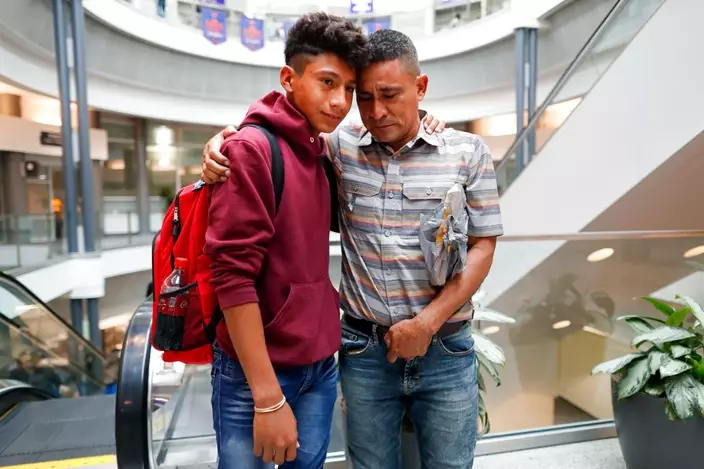
Edvin Cazun, of Guatemala, right, hugs his son Samuel at Cincinnati/Northern Kentucky International Airport as they reunite after being separated about a month ago at the southern border after they crossed the Rio Grande into the United States, Monday, July 23, 2018, in Hebron, Ky. Edvin said they were separated at the "detention" and he spent 15 days without knowing anything about his son. (AP Photo/John Minchillo)
It has been more than a month since immigration agents took Samuel away from his father after the two waded across the Rio Grande into Texas following about 15 days traveling by bus from Guatemala. On Monday afternoon, Samuel and his father, Edvin Cazun, tearfully embraced at the Cincinnati airport, reunited once again.
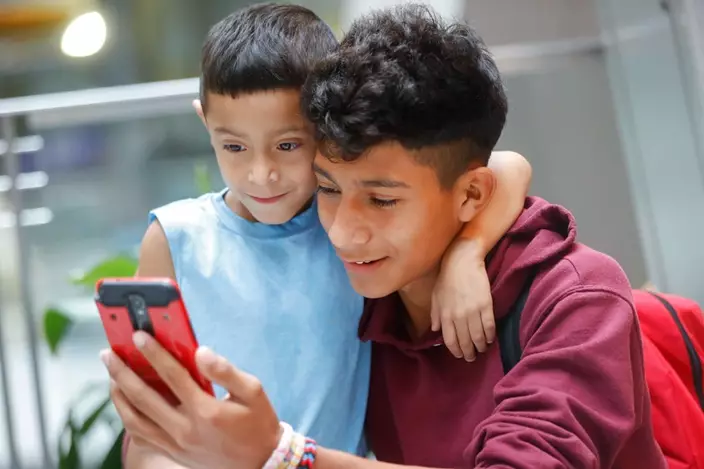
Samuel Cazun, of Guatemala, right, hugs his cousin Nelson, and speaks to his mother on a mobile phone after reuniting with his father Ervin at Cincinnati/Northern Kentucky International Airport following their separation about a month ago at the southern border after they crossed the Rio Grande into the United States, Monday, July 23, 2018, in Hebron, Ky. Edvin said they were separated at the "detention" and he spent 15 days without knowing anything about his son. (AP Photo/John Minchillo)
Samuel was all smiles when he caught sight of his father as he rode up on the elevator at the airport, waving to family members. A young cousin ran up to hug him. Edvin Cazun then briefly buried his head on his son's shoulders and embraced him before wiping away his own tears. While still at the airport, Samuel had a video chat with his mother in Guatemala on a relative's cellphone.
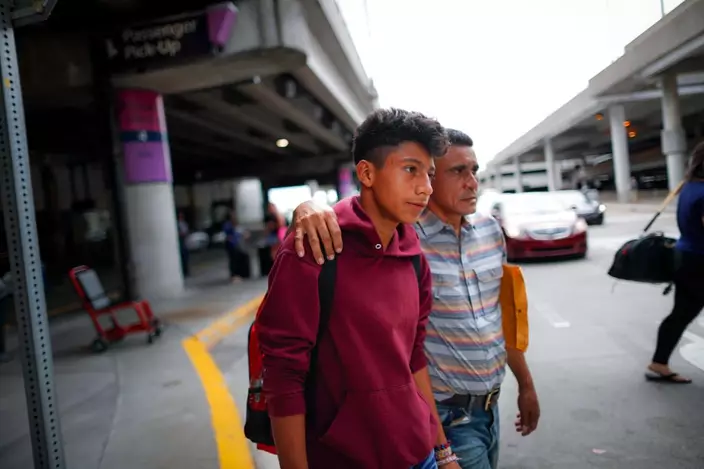
Samuel Cazun, of Guatemala, left, and his father Ervin, right, leave Cincinnati/Northern Kentucky International Airport as they reunite after being separated about a month ago at the southern border after they crossed the Rio Grande into the United States, Monday, July 23, 2018, in Hebron, Ky. Edvin said they were separated at the "detention" and he spent 15 days without knowing anything about his son. (AP Photo/John Minchillo)
Samuel told The Associated Press in Spanish that the separation was "very hard" and that it made him sad. He worried when he was in Kansas that his father would be deported and that he would never see him again.
Edvin Cazun said he initially tried to come into this country legally by paying for a worker visa, but he was instead ripped off by the people selling them. When he tried to get his money back, they threatened to kill him. So he fled with Samuel to the United States, leaving behind his wife and his four other children, ages 9 to 18, and is now seeking asylum in the hopes of giving Samuel a chance at a better life.
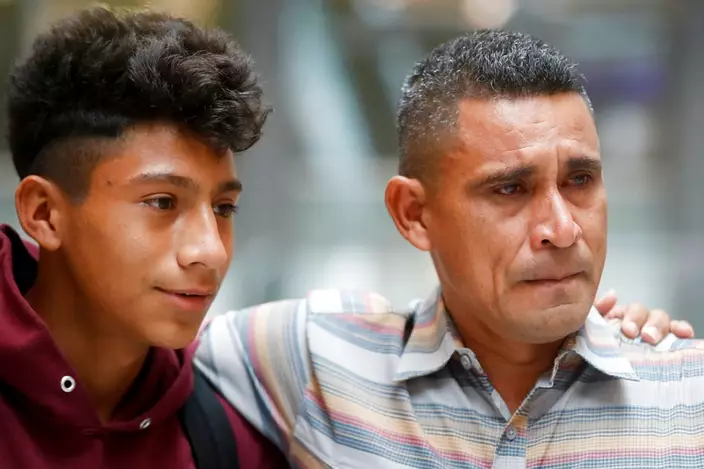
Edvin Cazun, of Guatemala, right, hugs his son Samuel at Cincinnati/Northern Kentucky International Airport as they reunite after being separated about a month ago at the southern border after they crossed the Rio Grande into the United States, Monday, July 23, 2018, in Hebron, Ky. Edvin said they were separated at the "detention" and he spent 15 days without knowing anything about his son. (AP Photo/John Minchillo)
"What I want now that we are together is for him to get ahead in life. I want to be responsible for him. I want him to study in this country. That is the best future for him, no? That is my desire as his father," Edvin Cazun said in Spanish.
Samuel said in a Tuesday phone interview that he wants to study in the United States and become a professional artist.
The Trump administration said in a court filing Monday that there have been 1,187 children reunified with their parents or "other appropriate discharges," which include guardians and sponsors. It added that some 463 parents may not be in the United States, saying those findings are based on case notes and are under review.

Samuel Cazun, of Guatemala, speaks with his mother on a mobile phone after reuniting with his father Ervin at Cincinnati/Northern Kentucky International Airport following their separation about a month ago at the southern border after they crossed the Rio Grande into the United States, Monday, July 23, 2018, in Hebron, Ky. Edvin said they were separated at the "detention" and he spent 15 days without knowing anything about his son. (AP Photo/John Minchillo)
Immigration attorney Clare Murphy Shaw is Samuel's attorney and said Tuesday that of the seven immigrant children in Kansas she represents in immigration court, five of them have already left The Villages. The two remaining separated children are scheduled to leave either Tuesday or Wednesday.
In what is the first public glimpse at life for migrant children at The Villages in Topeka, Samuel recounted how he was among 13 male teenagers housed in one of the group homes at the facility. He had his own bed and shared a room with another teenager. The food was good and the children could talk with their parents several times a week. They would also go to classes from 8:30 a.m. until 4 p.m. each day, studying English, mathematics, science, technology and other subjects.
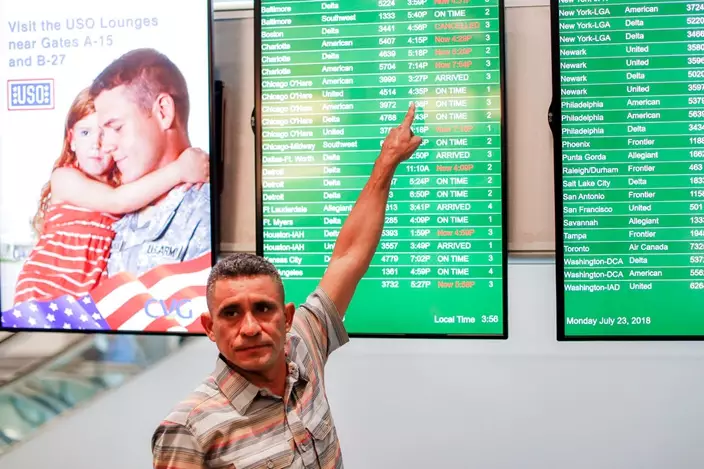
Edvin Cazun, of Guatemala, indicates the arrival time of his son Samuel's flight to family members at Cincinnati/Northern Kentucky International Airport before they reunite after being separated about a month ago at the southern border after they crossed the Rio Grande into the United States, Monday, July 23, 2018, in Hebron, Ky. Edvin said they were separated at the "detention" and he spent 15 days without knowing anything about his son. (AP Photo/John Minchillo)
There were a lot of rules to follow, such as not hugging other children, although a handshake was ok. No opening the windows. Don't go into someone else's room.
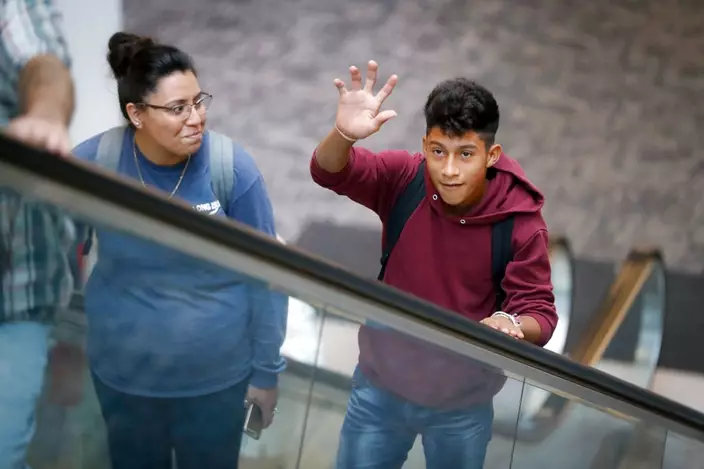
Samuel Cazun, of Guatemala, right, waves to his family at Cincinnati/Northern Kentucky International Airport before reuniting with his father Edvin after being separated about a month ago at the southern border after they crossed the Rio Grande into the United States, Monday, July 23, 2018, in Hebron, Ky. Edvin said they were separated at the "detention" and he spent 15 days without knowing anything about his son. (AP Photo/John Minchillo)
It was a lot nicer than facility the Samuel was kept in while in Texas. His first day he was kept in a cage that he compared to one used to contain animals. He slept on a mat on the floor. He thinks he probably spent five days at a second Texas facility but wasn't sure because there were no windows, the lights were on all the time and he couldn't tell whether it was even day or night.
But the hardest part was being separated from his father. Samuel said he prayed to God while at the Kansas shelter that they would soon be together.
"Now I am no longer sad," Samuel said.
DUBAI, United Arab Emirates (AP) — Scores of laborers from countries including India, Bangladesh and Nepal have faced preventable deaths from electrocution, road accidents, falling from heights, and more while working in Saudi Arabia, according to a report Wednesday by the advocacy group Human Rights Watch.
Human Rights Watch and another rights group, FairSquare, released separate investigations Wednesday detailing preventable deaths of migrant workers from job-site accidents and work-related illnesses.
The reports accuse Saudi authorities of often misreporting such deaths and failing to investigate, preventing families from receiving compensation from the kingdom that they are entitled to and knowing how their loved ones died.
As Saudi Arabia pushes ahead with hundreds of billions of dollars in infrastructure and development initiatives — including the 2034 men’s soccer World Cup and the futuristic city Neom — rights groups warn of thousands more avoidable deaths in the coming years.
In one case, Human Rights Watch said a Bangladeshi worker was electrocuted on the job. But his employer allegedly withheld the body, telling the family they would be compensated only if they agreed to a local burial.
Another family reported waiting nearly 15 years before they were compensated by the Saudi government.
“It’s very urgent that the Saudi authorities and FIFA put in place basic labor rights protections,” Minky Worden, Human Rights Watch’s director of global initiatives, told The Associated Press, referring to soccer's world governing body.
Authorities in Saudi Arabia did not respond to a request for comment.
FairSquare, which looked into the deaths of 17 Nepali contractors in Saudi Arabia over the last 18 months, warned in its report that without accountability, “thousands of unexplained deaths” of low-paid foreign workers are likely to follow.
“In some cases, you have families being pursued by money lenders for the loans that their (dead) husband or father took out in order to migrate to the Gulf,” said James Lynch, who co-directs FairSquare.
Saudi Arabia has long faced allegations of labor abuses and wage theft tied to its Vision 2030 project, a big-money effort to diversify its economy beyond dependence on oil.
FIFA shared with the AP a letter it sent Human Rights Watch last month defending the selection of Saudi Arabia as host of the 2034 World Cup.
The letter cited the Saudis' commitments to establishing “a workers’ welfare system” and enhancing “country-wide labor protections including through a strengthened collaboration” with the United Nations’ International Labor Organization.
The kingdom is not the only Gulf Arab state to be accused of abusing migrant laborers in the run-up to a World Cup. Rights groups also criticized Qatar, which hosted the competition in 2022, saying they tallied thousands of unexplained worker deaths.
But this time has the potential to be even worse for foreign workers, Worden said, noting that the 2034 World Cup has plans to require more stadiums and infrastructure with more teams competing.
Qatar established an oversight board called the Supreme Committee, which monitored FIFA construction sites and took reports of unsafe work conditions.
“There’s no such committee like that in Saudi Arabia,” Worden said, adding, “In the end, Qatar did have concrete policies like life insurance and heat protection. Those aren’t in place now” in Saudi Arabia.
The details of the investigations from Human Rights Watch and FairSquare come a day after FIFA President Gianni Infantino joined U.S. President Donald Trump on his official visit to Saudi Arabia, where Trump met with Saudi Arabia’s de facto ruler Crown Prince Mohammed bin Salman.
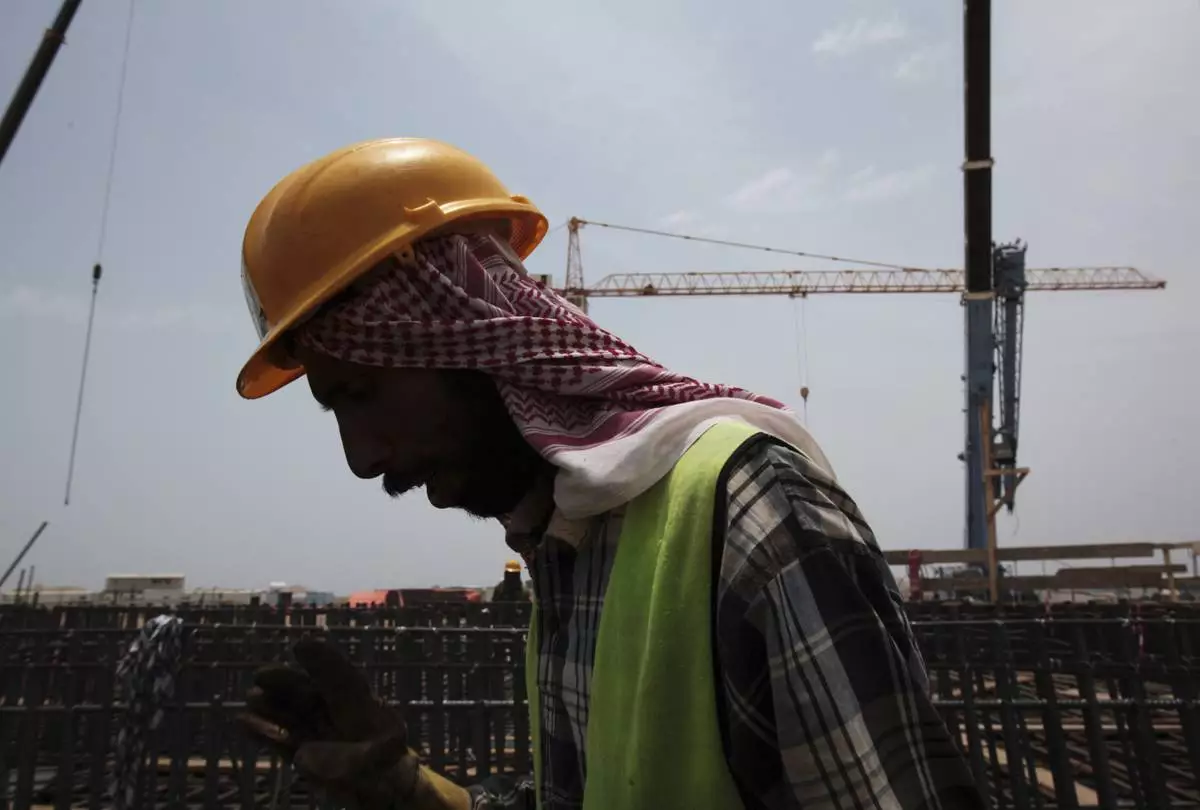
FILE - In this May 8, 2014, file photo a man works on construction of the Kingdom Tower, a planned 252-story building, which aims to become the world's tallest skyscraper when complete, in Jiddah, Saudi Arabia.(AP Photo/Hasan Jamali, File)











